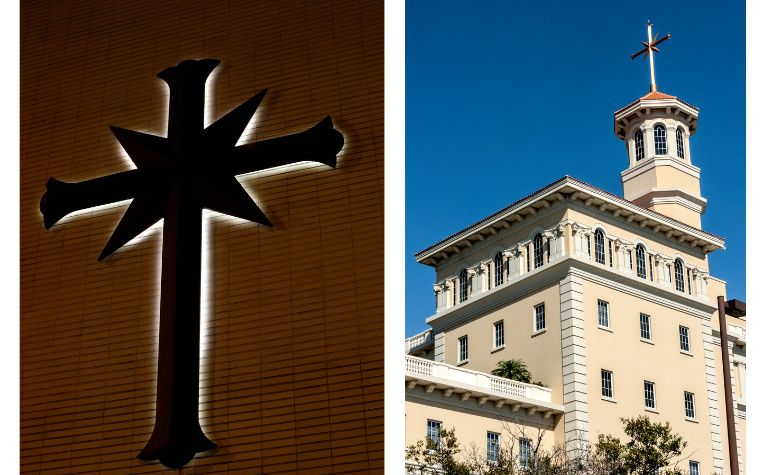Christianity and Scientology are two distinct systems of faith with differing beliefs, practices, and historical backgrounds.
Christianity, founded on Jesus Christ’s teachings, emphasizes salvation through faith and focuses on love and forgiveness. It has the Bible as its sacred text.
Scientology, founded by L. Ron Hubbard, teaches self-discovery and spiritual growth through practices like auditing and has texts like Dianetics.
Keep reading to see charts that compare the beliefs, founders, practices, and history of Christianity and Scientology.

Comparing Christianity and Scientology: At a Glance
“Christianity” derives from the Greek word “Christos,” meaning “anointed one,” referring to Jesus Christ.
“Scientology” combines “scio,” a Latin word meaning “knowing,” and the Greek word “logos,” meaning “study of.”
It essentially means the study of knowledge or truth, reflecting the religion’s focus on self-understanding.
| Aspect | Christianity | Scientology |
|---|---|---|
| Name | Christianity | Scientology |
| Size | Approximately 2.3 billion adherents | Estimated to be a few hundred thousand members |
| Date Started | c. 1st Century AD | 1954 |
| Founder | Jesus Christ | L. Ron Hubbard |
| Key Beliefs | Belief in one God, Jesus Christ as the Son of God, salvation through faith in Christ, the Holy Trinity | Thetans (spiritual beings) inhabit human bodies, auditing (counseling) to clear negative influences, achieving a state of “Clear” |
| Key Practices | Worship, prayer, reading the Bible, baptism, communion | Auditing, study of Hubbard’s works, participating in church services |
| Divisions | Roman Catholicism, Protestantism, Eastern Orthodoxy | Church of Scientology, Independent Scientologists |
| Central Location | No central location, major centers in Rome (Catholicism), Constantinople (Eastern Orthodoxy) | Church of Scientology International, Los Angeles, CA |
| Sacred Texts | The Bible | Dianetics: The Modern Science of Mental Health, other works by L. Ron Hubbard |
What is a Thetan in Scientology?
A “Thetan” is the term for the immortal, spiritual part of an individual. Thetans are believed to have lived through multiple lifetimes and are considered the true self of a person, separate from the body and mind.
Jesus Christ and L. Rob Hubbard Side by Side
The name “Jesus” means “God saves” in Hebrew. The title, “Christ,” is Greek for “Anointed One.” In Hebrew, “Christ” is “Messiah.” The name L. Ron Hubbard has no specific religious meaning.
| Aspect | Jesus Christ | L. Ron Hubbard |
|---|---|---|
| Lifetime | Approx. 4 BC – 30/33 AD | March 13, 1911 – January 24, 1986 |
| Home | Born in Bethlehem; raised in Nazareth, Israel | Born in Nebraska, USA; lived in various places in the USA and abroad |
| Family | Born to Mary and Joseph; siblings mentioned in the Bible | Born to Harry Ross Hubbard and Ledora May; married three times and had seven children |
| Message | Salvation, love, forgiveness, and the Kingdom of God through faith in Him | Dianetics and Scientology principles for spiritual improvement and self-discovery |
| Sacred Text | The New Testament of the Bible | Dianetics: The Modern Science of Mental Health; other Scientology texts |
Dianetics introduces the concept of “auditing,” a form of counseling to clear the mind of negative experiences. The book lays out the principles of the practice and forms the basis for Scientology beliefs.
What is auditing in Scientology?
Auditing in Scientology is a process where an auditor helps an individual recall past traumas and negative experiences.
The goal is to clear these experiences from the person’s mind, reducing their influence on current behavior and emotions.

Christian and Scientology Beliefs: Similarities and Differences
Christianity teaches the belief in monotheism, asserting that there is one God who exists in three persons. Because of this, God is commonly called a “Trinity,” comprised of Father, Son, and Holy Spirit.
| Aspect | Christianity | Scientology |
|---|---|---|
| God or gods | One God, existing as the Holy Trinity | No deity worship, belief in an immortal spirit called Thetan within each person |
| The Universe | Created by God; Earth is a temporary residence for humans | Not a primary focus, but considered a physical realm for Thetans to experience |
| Ultimate reality | God’s eternal kingdom; union with God through salvation | The state of being “Clear,” free from past traumas and negative influences |
| Human beings | Created in God’s image; male and female, body, soul/spirit | Thetans, immortal spirits, inhabiting human bodies |
| The problem with the world | Sin, separation from God | Engrams, negative mental images, from past traumas |
| The solution to the problem | Faith in Jesus Christ, repentance, and receiving God’s grace | Auditing, clearing engrams to achieve the state of Clear and higher spiritual states |
| The afterlife | Heaven or hell based on faith and relationship with God | Reincarnation, Thetans move to new bodies after death |
What does being “clear” mean in Scientology?
Being “Clear” means that a person has successfully addressed and eliminated the negative influences of past traumas and experiences through auditing by removing engrams.
As a result, the individual is considered to be free from the reactive mind’s influence and can operate at their full potential.
The Bible and Dianetics: Side-by-Side Comparison
| Aspect | The Bible | Dianetics |
|---|---|---|
| Author(s) | Multiple authors | L. Ron Hubbard |
| Date of Publication | Multiple books written between 1400 BC and 90 AD | 1950 |
| Language of Original Text | Hebrew, Aramaic, and Greek | English |
| Purpose | Sacred text containing law, poetry, parables, history, moral guidelines, and more | Self-help book outlining the theory and practice of Dianetics |
| Overview | Collection of texts including historical narratives, poetry, prophecies, and letters | Presents a methodology to address and resolve mental and emotional problems |
| Main Teachings | Teaches about God’s relationship with humanity, salvation, morality, and the life and teachings of Jesus Christ | Introduces concepts such as the reactive mind, engrams, and auditing |
| Influence | Central text of Christianity, widely regarded as the Word of God | Foundation of Scientology, regarded as the definitive text on Dianetics |
| Notable Quotes | “For God so loved the world that he gave his one and only Son, that whoever believes in him shall not perish but have eternal life.” (John 3:16) | “The source of aberration has been discovered to be a hitherto unsuspected sub-mind which, complete with its own recordings, underlies what Man understood to be his ‘conscious mind’.” (Dianetics) |
| Impact | Shaped the moral and spiritual values of Western civilization, inspired countless works of art, music, and literature | Paved the way for the establishment of the Church of Scientology and influenced the development of auditing techniques |

10 of the Most Important Events in Christianity and Scientology
Knowing Christian and Scientology history is essential when comparing these faiths because it provides insight into the beliefs, practices, and events that have shaped these religions.
| Christianity | Scientology |
|---|---|
| Birth of Jesus Christ (approx. 4-6 BC) | Publication of Dianetics: The Modern Science of Mental Health by L. Ron Hubbard (1950) |
| Crucifixion of Jesus Christ (approx. 30-33 AD) | Founding of the Church of Scientology (1954) |
| Resurrection of Jesus Christ (approx. 30-33 AD) | Release of the E-meter, a device used in auditing (1954) |
| Paul’s missionary journeys (approx. 44-58 AD) | Opening of the first Church of Scientology in Los Angeles, California (1954) |
| Council of Jerusalem (approx. 50 AD) | Founding of the Sea Organization, an elite group within Scientology (1967) |
| Council of Nicaea (325 AD) | Launching of Operation Snow White, an attempt to expunge negative records about Scientology (1973) |
| Conversion of Constantine (312 AD) | Conviction of 11 Scientologists, including Hubbard’s wife, for crimes related to Operation Snow White (1979) |
| Great Schism between Eastern and Western Christianity (1054) | Death of L. Ron Hubbard and David Miscavige taking over leadership (1986) |
| Martin Luther’s 95 Theses and the beginning of the Protestant Reformation (1517) | Opening of the Church of Scientology Flag Building in Clearwater, Florida (2013) |
| Second Vatican Council (1962-1965) | Launch of Scientology Network, a TV channel promoting the religion (2018) |
Related Questions
Christianity and Islam are two of the world's largest religions, each with unique beliefs, practices, and traditions. Originating in the Middle East, they share some historical roots and monotheistic...
Exploring the world's religions using the comparison charts below offers fascinating insights into cultures and beliefs. It opens doors to understanding human history, values, and...
